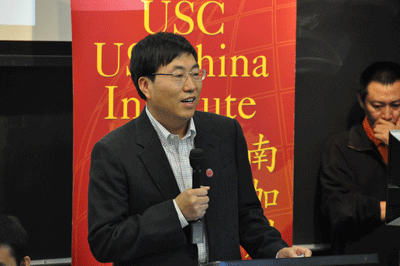In 2011, the Academy for International Communication of Chinese Culture (AICCC) conducted a survey of international views toward Chinese cinema. The AICCC concluded that foreign audiences simply don't understand Chinese films and culture. To discuss this, AICCC selected five films that provided popular in China. At USC five AICCC scholars will discuss these films and other issues with American specialists.
About AICCC
Jointly established by Beijing Normal University and International Data Group (IDG) , the Academy for International Communication of Chinese Culture aims to introduce and disseminate Chinese culture worldwide more effectively and contribute to a harmonious world culture through solid, in-depth research and art works with Chinese characteristics by effectively integrating resources from Beijing Normal University, IDG, relevant government departments, enterprises, non-profit organizations and communities.
 Ding Yaping is Director of Film and Television Art Research Institute, Chinese National Academy of Arts; Professor and supervisor of postgraduate candidate. He has guest professorship of Film and Television Art College, at the Communication University of China. He is also a member of the film censorship committee of the State Administration of Radio Film and Television. Ding received his B.A. and M.A. in Chinese Literature in 1982 and 1987 from Suzhou University and the Communication University of China. He received his Ph.D in Film Study from Chinese National Academy of Arts in 1996.
Ding Yaping is Director of Film and Television Art Research Institute, Chinese National Academy of Arts; Professor and supervisor of postgraduate candidate. He has guest professorship of Film and Television Art College, at the Communication University of China. He is also a member of the film censorship committee of the State Administration of Radio Film and Television. Ding received his B.A. and M.A. in Chinese Literature in 1982 and 1987 from Suzhou University and the Communication University of China. He received his Ph.D in Film Study from Chinese National Academy of Arts in 1996.
This video is also available on the USCI YouTube Channel.
For the rest of the Film Festival Speakers:
Richard Anderson | Chen Xihe | Sherwood Hu | Huang Shixuan | Huang Huilin | Robert Rosen | Stanley Rosen | Jason E. Squire | Zhang Tongdao




